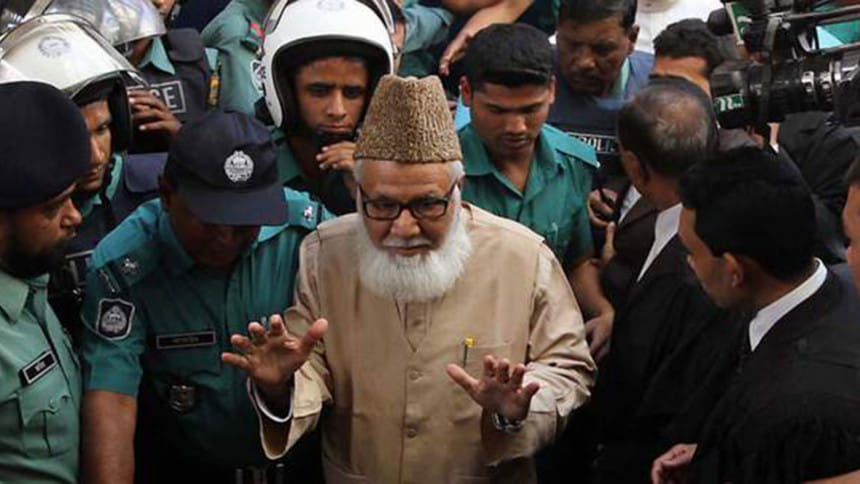Verdict on Nizami appeal Jan 6

The Supreme Court today fixed January 6 for delivering verdict on the appeal filed by war criminal Motiur Rahman Nizami challenging his death penalty.
The four-bench of the Appellate Division headed by Chief Justice Surendra Kumar Sinha set the date after concluding hearing on the appeal.
During the hearing, Attorney General Mahbubey Alam prayed to the apex court to uphold the death penalty of Nizami saying the Jamaat-e-Islami chief instigated the Al-Badr, an auxiliary force of the occupation Pakistani army, to commit the crimes against humanity including killing the intellectuals in 1971.
READ MORE: Commute death sentence of Jamaat chief Nizami
Meanwhile, defence lawyer Khandker Mahbub Hossain, the principal counsel for Nizami, urged the court to acquit his client from all the eight charges brought against the 75-year-old Jamaat leader.
He however prayed to the court to commute his death sentence to life imprisonment if the apex court finds him guilty of his wartime offence.
International Crimes Tribunal-1 on October 29 last year handed Nizami the death penalty on four charges of war crimes, including murdering intellectuals. He was awarded life imprisonment on four other charges.
On November 23 last year, Jamaat-e-Islami chief Nizami challenged the ICT-1 verdict.
Nizami must be sentenced to death: AG
Talking to reporters following today's court hearing, the attorney general observed that people will be frustrated if Nizami is not sentenced to death for his crimes against humanity in 1971.
Mentioning that Nizami had written an article titled "Badr Dibosh" [Badr Day], the AG said in that article Nizami had encouraged the al-Badr force to kill pro-liberation people including the freedom fighters.
Mahbubey Alam also claimed that Nizami's lawyer Khandker Mahbub Hossain had admitted to be true the incidents of crimes against humanity during the 1971 Liberation War.
Jamaat-e-Islami leaders Ali Ahsan Mohammad Mojaheed and Kamruzzaman, who were followers of Nizami, had already been sentenced to death and executed for their war crimes, the AG mentioned.
"So, Nizami must be sentenced to death for his war crimes," Mahbubey Alam said.
The AG expressed hopes that the Supreme Court will uphold Nizami's death penalty.

 For all latest news, follow The Daily Star's Google News channel.
For all latest news, follow The Daily Star's Google News channel. 








Comments